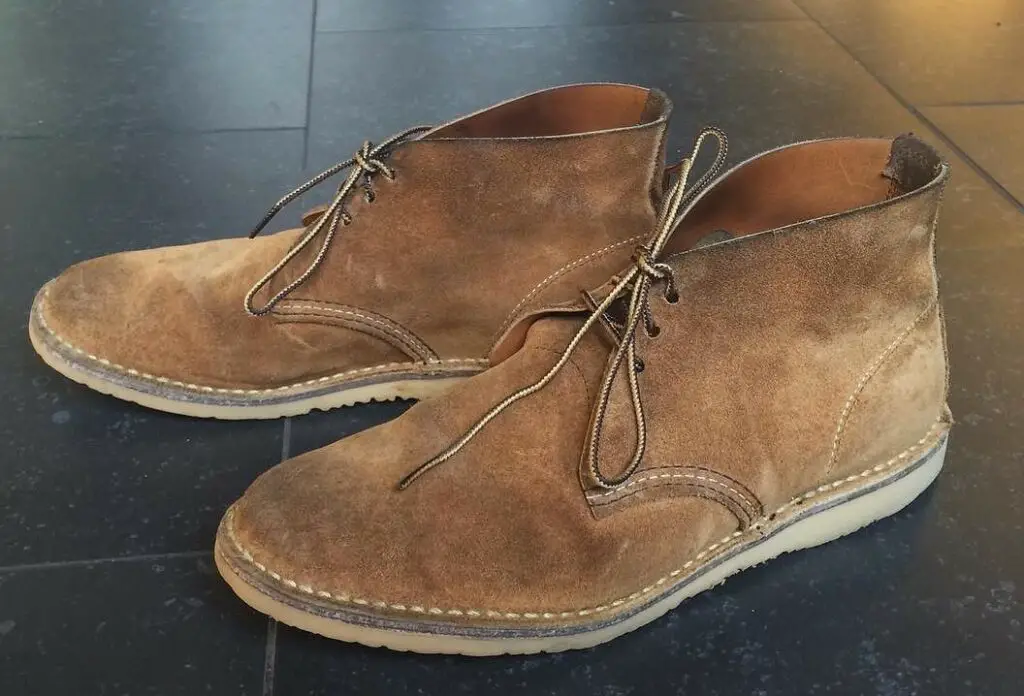Leather work boots are not only precious but a little tough pickle. It takes no long to damage the leather of your work boots be it a single spill or one rough nick.
When you go purchasing boots, I am sure you must have come across both nubuck and suede.
 While nubuck is slightly thicker, suede comes on the softer side but both are durable and hardy. So, what about their maintenance?
While nubuck is slightly thicker, suede comes on the softer side but both are durable and hardy. So, what about their maintenance?
Is oiling a good option for both types of leathers?
Yes, oil like mink oil can be applied appropriately on suedes. However, it is not advisable to use the same on nubuck. The mink oil gets through the pores of the nubuck work boots and gets completely soaked in, leaving a patch or sometimes a white residue.
Not just this, after oiling, you could even smell the oil which sometimes becomes unacceptable. Talking about suede, oil can give new life to leather and waterproof the suede making the boot more weather resistant.
Let’s explore some more about both types of leathers and what happens when you apply oil on both of these.
What is the difference between Suede and Nubuck?
I am pretty sure that while purchasing leather boots you must have come across both suede and nubuck leather. But can you distinguish between the two? Let’s have a look at some of the key differences with the help of this simple table.
| Category | Suede | Nubuck |
| Origin | Cow, sheep, deer and other animals | Mostly made from cowhide |
| Used In | Used in making shoes, jackets, wallets and more. | Mostly shoes |
| Texture | Soft, pliable and delicate | Tough, sturdy and rough |
| Source | The interior part of the hide split from the exterior. | The exterior part of the hide. |
| Weight | Thin and lightweight | Thick and heavyweight |
| Durability | Not very durable | More durable than suede |
| Cleaning | Needs special leather care | Needs special leather care |
| Cost | Cheaper than nubuck | Expensive than suede |
Pros and cons of oiling suede boots
Down below are some of the pros and cons of using oil on suede work boots:
Pros of using oil on suede
1.) It can be used to darken suede
Now you might be thinking, is this something that you want? Well, there are some instances where darkening your boots can be an amazing idea.
Like when your boots are new, the colour can be a bit lighter than expected or when the suede leather has seen a lot of wear, they tend to lighten a bit. In such a case scenario, oiling can tone down the colour of the suede.
2.) Oiling can give that patina to your suede
Oiling your boots can be helpful in aging leather or what we commonly call ‘patina’. Patina is important for your leather work boots as it portrays a special character the leather builds up. Therefore applying oil to suede gives it a rich and rugged look.
3.) It increases the life of your work boots
Proper oiling on suede leather can make your pale looking and old work boots newer as before and can rejuvenate them quite well.
Cons of using oil on suede
The negative sides of using oil on suede are:
-
-
- It hardens the leather when you use it for a long period of time.
- It can darken the leather too much.
- It cannot provide that glossy shine to your boots which certain leather conditioners can.
-
What kind of oil to use on suede and nubuck?
Suede and nubuck are different from other leathers and hence these both types require a bit different maintenance. So, what kind of oils are appropriate for these?
A good oil for suede and nubuck is Saphir Medaille d’Or or Sof Sole Mink Oil. These mink oils are very gentle and work best when compared to other options. They guarantee to give the leather a treatment to bring new life to it.
When is the Right Time to Oil your boots?
If you own leather boots, I am sure that you are aware of the fact that at some point it’s likely they need to be oiled and conditioned. But when? There are a few signs which call out for oiling. They are as follows:
1.) Every few months as a proactive maintenance.
If you are using your boots quite frequently then you should oil your boots every six months. This will prevent leather damage and larger issues from coming up.
2.) When your boots begin to lighten in colour
This happens when the moisture is lost and hence it is a sign that now it’s high time you should oil your boots.
3.) When your boots become less flexible and more stiff.
When your leather boots are used for a longer period of time, they can become both stiff and rigid and hence they require oiling.
4.) When you start observing small cracks
Once the suede or nubuck has lost its flexibility, the fibres of your boots begin to crack as you bend them. If you have started observing cracks lately then it’s a sure sign that your boots are demanding a bit of oiling.
Final Verdict
Quality leather whether suede or nubuck can last for quite a long time, when properly maintained and cared for. Oiling your leather boots periodically is an easy and pocket friendly method to preserve them.
It’s rather a quick process and if you are using the right oil, I am sure your boots will not only look good but will last for a little longer. So, when are you oiling your boots?







